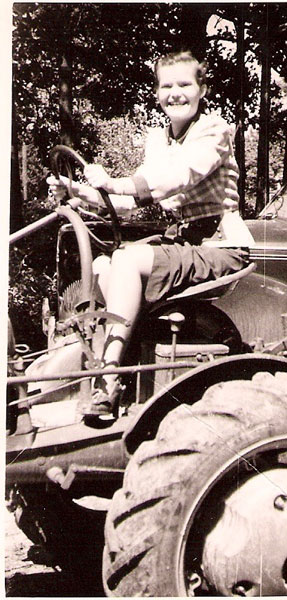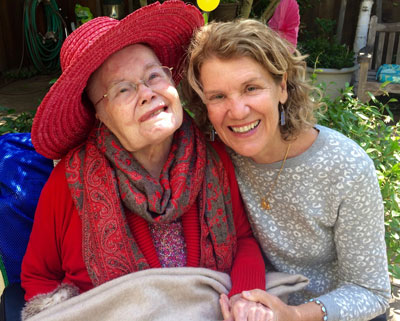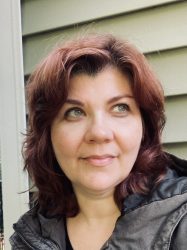A Mother’s Greatest Gift

My mother gave me many gifts. She passed on her love of gardening, her joy in simple acts like arranging wildflowers or listening to the song of the cardinal, and the pleasure of reading a book. She taught me how to turn the other cheek when wronged, how to “go high” even when others “went low.”
But her greatest gift was to be happy.
Not that her circumstances weren’t challenging at times. When my brother was just a few months old in 1949, my parents picked up stakes in Ohio and towed their tiny mobile home to Memphis, Tennessee.
They quickly found a seven-acre parcel of land northeast of the city and parked their trailer on it. There they would literally camp for four years, with an outhouse for a toilet and an outdoor pump for water, while they built their first home. My father worked as an engineer at International Harvester designing plows and farm equipment during the days, and toiled late into the evenings and weekends to build a small house without mortgage or debt.
I was born while they still lived in the trailer, and my mother would set my basinet under the trees while she washed my cloth diapers using a bucket, an immersion coil, and a hand-cranked wringer. The home was finally ready to move into when I was two, and my sister, Cathy, was the first baby born in a home with indoor plumbing.
Yet my mom never spoke of those years as a hardship. On the contrary, her face would light up as she told stories of raising her babies in the fresh air and working side-by-side with Dad to build their own home on their own land. Looking at pictures from that era, she is always dressed stylishly and is smiling radiantly (my favorite picture is of my petite mother sitting on their tractor wearing high heels). To her it was all a grand adventure. In fact, she often said, “Those were the happiest years of my life.”
My dad was transferred north when I was six, and they did it all over again, building a beautiful passive-solar custom home in the Chicago suburbs. That home was truly a paradise, surrounded by charming wild flower gardens, birdsong and the shady protection of tall oak trees.
Basically my parents lived the American dream and prospered. Years passed and my sister and brother and I grew up and lived our lives in other states.
We were a happy family, but the true test of happiness, we were to find, was how you respond when life takes a direction you don’t foresee.
The Test of True Happiness
When our parents reached their 80s, we started to see signs. Mom was repeating herself many times in a conversation. Dad stopped raking the leaves or monitoring their finances. On the same day in January 2009, my mother and my father were diagnosed with dementia, confirming our worst fears. It was the most devastating day of my life.
Cathy and I scrambled to help parents who had never asked for anything—their credo was to stay independent and help others. Cathy took over their financial affairs and I started spending half my time in Illinois—managing their home, their healthcare, and the incredibly devoted, round-the-clock healthcare providers whom we hired.
Caring for one parent with dementia is a challenge—caring for two was clearly beyond my capacity to give at times. Yet as a “parent to my parents,” I knew that above all, I needed to remain calm and happy, as my mom had done for us all these years.
“Happiness or misery depends on our dispositions and not our circumstances,” said Martha Washington, our nation’s first First Lady. This was what my mother modeled. Yet I also knew it was hard for me to be happy when I got too tired, when I got too stressed.
At this point in my life, I was incredibly grateful for my daily practice of Transcendental Meditation, which helped me find both calm and courage within. Many times the chaos of the day—or the stress of taking charge of my parents’ lives—overwhelmed me. Yet as I sank into the soft, blissful state of my own pure awareness each morning and evening, my body let go of the stresses of the day and my mind let go of the worries. When I came out of meditation, I felt fresh, rested. Suddenly solutions would appear.
My mom had learned TM years before and found it helped her be less nervous and enjoy life more. She hadn’t continued, but now we often meditated together, and when she opened her eyes, she was glowing with light. In many ways, we grew closer during these years. As a middle child, I relished having her to myself for shopping and other outings. Her dementia, it turned out, was vascular and not a progressive form like my father’s, so her personality and ability to interact lovingly remained intact. She made friends with the caregivers, basking in their attention. She found a way to laugh often, to be happy with her new circumstances.
I truly believe that this was not a superficial kind of mood making on her part, but resulted from her ability to draw deep from her inner resources. As Maharishi Mahesh Yogi, the founder of the Transcendental Meditation technique says in his book, On the Bhagavad Gita: A New Translation and Commentary, “If his happiness does not lie in the outside world and yet he is happy, his happiness can only be within himself” (Chapter 5 Verse 24).
Long story short, the time came when my parents could no longer stay in their beloved home, but needed additional care. Cathy found a truly progressive and uplifting memory care facility close to her home in Oakland, CA, and generously made plans to retire early so she could give our parents the loving attention they needed.
Changes kept coming to our family, and not the kind you look forward to. Within two short years, my mom had lost her husband, her home, her short-term memory, and her ability to walk, write, and read due to a stroke.

Being Happy Is A Precious Gift to Others
Needless to say, our entire family was struggling with loss and grief, but our tiny mother was struggling the most. My parents had been so devoted to each other that we wondered if, like many close couples, Mom might lose the will to live at all.
But with the same determination that made her recover her speech in the year after her stroke, Mom began to adapt to her new situation.
With childlike eagerness, she sat next to Bill or Barbara, the activity directors, like the teacher’s pet. She found she was good at trivia. When Bill called out “Illinois,” she was the first to name the capital: “Springfield!”
She learned new songs. If you stopped to talk to her, she smiled and took your hand and kissed it. She radiated joy. When a caregiver handed her a fruit smoothie at snack time—a replacement for pastries—she first asked if I wanted some and then sipped it with gusto. “It’s delicious,” she’d say. “You should order one!” as if we were lounging poolside at a spa.
The miracle was that our shy, introverted mother not only adjusted to her new circumstances—she embraced them and everyone she met with joy.
When I’d call from Iowa to speak to her at night, she sometimes told me she was working during the day, helping other people. I believed her. She was working to make others happy, with her smile, her gentle humor, with her radiant being. Her last words of advice at the end of every phone call: “Be happy.”
I learned early on that she was making this choice every single day. Occasionally on the phone she would slip into sadness about my dad. “He was such a handsome young man,” she’d say. “He was always helping me.” She’d sob a little, but then, as if talking to herself, she’d say, “But I can’t dwell on that. I have to be happy.”
Like any children, we could not bear to see our sweet mother suffer, so this was the greatest gift she could have ever given us. Through her joy and gratitude, she turned darkness into light. Ever my teacher, she also became my hero.
Our mother passed away just three months ago. This is our first Mother’s Day without her, made even more poignant by the fact that this year her 90th birthday also falls on that day, and our entire family was planning to gather for a grand celebration.
Yet I can only feel grateful for my mother’s many gifts and remember the words she spoke to me the last time I called her. “Be happy,” she said. It’s easy to do that, Mom, when I remember your radiant smile.
About the Author
Linda Egenes writes about green and healthy living and is the author of six books, including The Ramayana: A New Retelling of Valmiki’s Ancient Epic—Complete and Comprehensive, co-authored with Kumuda Reddy, M.D.
More Posts by Linda
- Tired and Burned Out? Transcendental Meditation Can Help: An Interview with Dr. Nancy Lonsdorf, MD
- Worried About the Future? Six Ways to Calm Your Anxiety
- What Do You Carry in Your Self-Care Tool Kit?
- Five Strategies for Family Caregivers
- From the Streets to College in Four Months: The Communiversity of South Africa Empowers Underserved Youth in Cape Town





